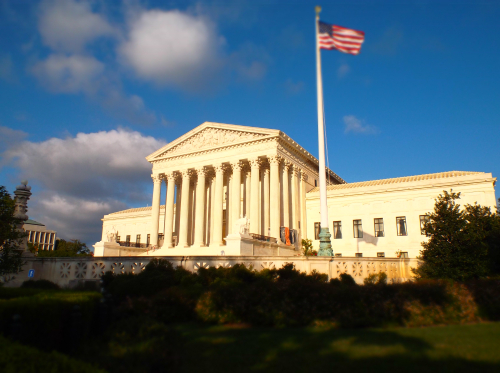Another takings opinion from the Supreme Court, this time in a (putatively) eminent domain case we’ve been following.
In PennEast Pipeline Co., LLC v. New Jersey, No. 19-1039 (June 20, 2021), the majority (Roberts, CJ, joined by an unusual, cross-aisle lineup of Justices Breyer, Alito, Sotomayor, and Kavanaugh) concluded that a private pipeline which has been delegated the federal power of eminent domain in the Natural Gas Act, may, in a federal court lawsuit, condemn property owned by the State of New Jersey.
The case asked whether New Jersey – not some mere private landowner – can be haled into a federal court as a defendant in a NGA private pipeline taking. The issue isn’t the same as a typical NGA pipeline case in which a private landowner can’t assert Eleventh Amendment immunity. As a consequence, here we witnessed a much different result in the way the lower courts treated the condemnee. Unlike virtually all other NGA cases in which the private pipeline condemnor pulled the usual “quick-take-by-preliminary-injunction” trick to get immediate possession of the property (even though the NGA doesn’t delegate the federal government’s quick take power), the Third Circuit invalidated the PI.
Thus, because of the 11th Amendment focus, we had lowered expectations that this case would produce much in the way of anything helpful on the property rights or eminent domain front. See lawprof Ilya Somin’s summary of the case for more: “Eminent Domain Prevails Over Sovereign Immunity in Supreme Court Case Both Sides Deserved to Lose.” What worried us most was the mischief that might result if the Court made any wayward assumptions about eminent domain law. Thankfully, we didn’t see any glaring problems in the opinion, especially something we harped on during oral arguments about eminent domain being an “in rem” action. See, e.g., Tr. at 5 (“Second, the proceedings here are in rem and can only augment the state treasury. This Court has recognized that in rem proceedings pose a lesser threat to state sovereignty.”). About the only thing that might give us pause is everyone’s assumption that when delegating eminent domain to private parties, those parties may exercise the same power as does the federal government. Maybe that’s true as a matter of the NGA, even if it is not correct as a general matter.
Because Professor Somin covers the arguments and three separate opinions better than we can, we’re just going to suggest you go read his summary:
Despite the majority’s grandiose references to “[t]he plan of the Convention,” they cite no evidence that anyone at the Constitutional Convention (or at the later state ratifying conventions) ever actually said that the federal government would have a general power to use eminent domain within the states (as opposed to federal territories)—much less that it would have the power to condemn state-owned land specifically. If there was such a plan, it must have been a very carefully kept secret!
As co-blogger Will Baude demonstrated in a pathbreaking 2013 Yale Law Journal article (cited by the dissenters), the dominant view at the time of the Founding and for many years thereafter was that the federal government did not have a general power to use eminent domain within the states. The “plan” referred to by Roberts simply did not exist.
This one turned more on classic federal courts topics than eminent domain (although please do read the majority opinion from pages 7 to 9 for the Chief’s summary of how we got from the Bible and Grotius to delegations of the federal eminent domain power to private entities).
Consequently, we probably won’t have much to say about this case, other than we’re relieved that it didn’t screw up eminent domain law as it had the potential to do.Check it out and see if you agree.
PennEast Pipeline Co., LLC v. New Jersey, No. 19-1039 (U.S. June 20, 2021)
